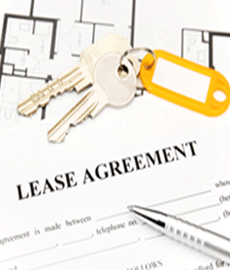Expanding Your Business?
Here are some Helpful Tips on Leasing Commercial Space

BUSINESS PLAN. Whether you are a new or seasoned entrepreneur, make sure you develop
a business plan before looking for additional space to lease. A business plan is
estimated to increase the success rate for business owners. You can receive FREE
assistance to develop or update your business plan at one of the several SCORE offices
www.atlanta.score.org and Small Business Development Centers www.georgiasbdc.org,
both administered by the U.S. Small Business Administration.
RESOURCES. Before signing a lease agreement, make sure you have secured the appropriate
funding for the business, either through your own capital, a loan, investors, or
another funding source.
RESEARCH. Do your homework before signing any lease agreement. Find a location that
is accessible to your customers and suited to the needs of your business. Location
is one of the most important aspects of real estate. Pay attention to its visibility,
access to major roads or highways, and demographics.
SPACE. Make sure the space you are considering is big enough for both your current
needs and your foreseeable growth. Be realistic and do not over commit. Evaluate
if the physical location and space is a good fit for your business and products.
ZONING. Find out if there are any restrictions either from local zoning authorities
or the landlord that would prohibit your type of business in the area or specific
property.
MARKET STUDY. Do a market study to identify your closest competitors, and become
familiar with their products and prices. Check out neighboring businesses offering
services or products that would complement and bring additional customers to your
business.
SIGNAGE. Signs are vital to retail businesses; therefore, investigate if there are
any restrictions on signage, either by the landlord or zoning. Quite often, local
zoning authorities control and restrict signage in terms of number of signs allowed,
size, and even color.
PROPOSAL. Always start with a Proposal, also known as a Letter of Intent (LOI),
to set forth and negotiate the terms of your lease. Ask for clarification if the
wording is confusing or leaves you wondering who is liable for what. When comparing
two or more proposals, make sure you look at all components and do an ‘apples to apples’
analysis.
LEASE LANGUAGE. A lease negotiation usually covers terms and language that require
additional explanation. Do not be afraid to ask questions about terms that you are
not familiar with. Before signing a lease agreement, ask for a copy and a couple
of days to carefully read and understand the lease. You may wish to consult with
a real estate attorney.
UTILITIES AND MAINTENANCE. Clarify in advance with the landlord who is responsible
for paying the utilities. Also, understand who is responsible for maintaining the
heating, air conditioning, electrical, plumbing and any other systems, as well as
keeping up the parking lot and building exteriors.
INSURANCE. Investigate liability insurance carefully. Since the general public may
be walking through your store or business, be sure that you have adequate coverage
in case an accident happens in your business. Also, you will need to have your own
insurance to protect your products and equipment.
RATES. There are several aspects that impact leasing rates such as length of lease,
amount of landlord’s improvements to the space, broker commissions, your credit
score and financials. Shop around and make sure the rates are competitive and according
to the market area.
YOUR CREDIT SCORE. Take good care of your credit score. Most landlords will check
your credit score and financial history. Individuals with bad credit scores may
not be approved to lease spaces or may be required to pay higher security deposits.
If you are ready to start the Leasing process with us, please download our
Prospective Tenant Application, and either the
Individual Credit Application or the
Corporate Credit Application, and give us a call.